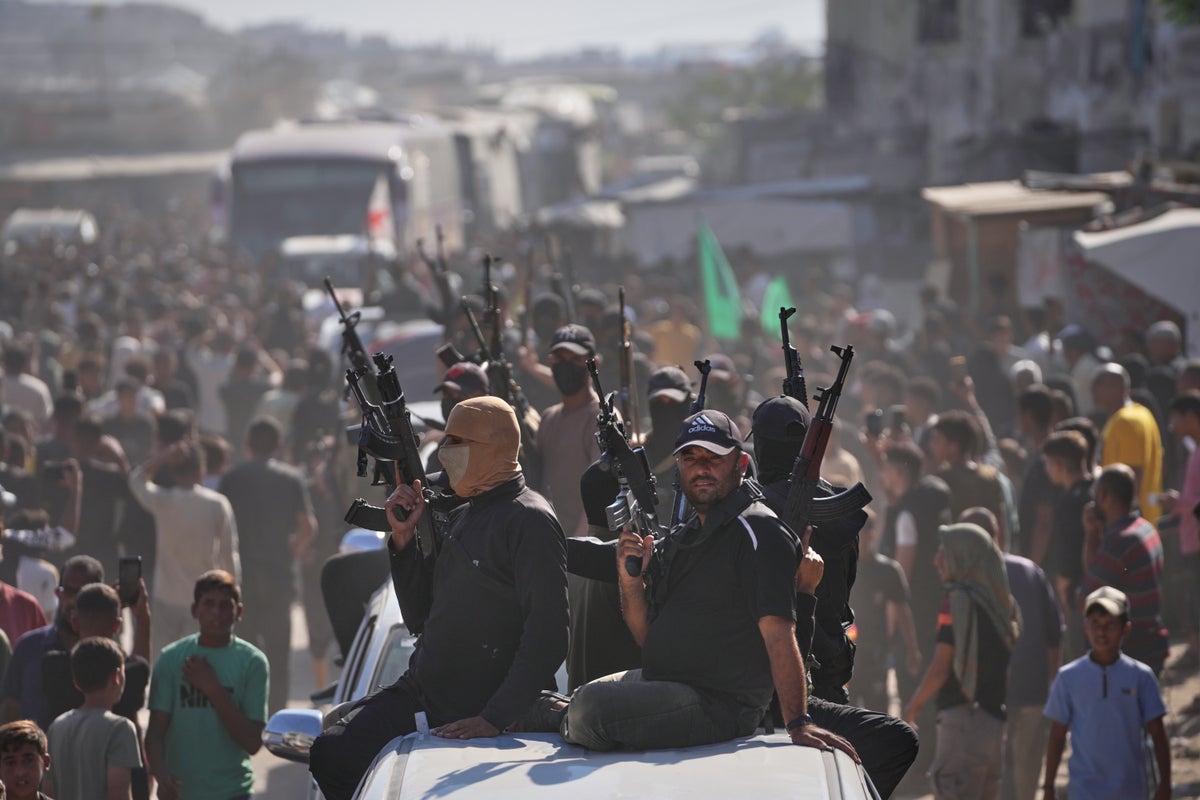Politics
Hamas Reasserts Control in Gaza, Threatens Fragile Ceasefire

As the ceasefire in Gaza continues to hold, Hamas has intensified its presence on the streets, engaging in confrontations with armed groups and claiming responsibility for the deaths of alleged gang members. This effort is framed by Hamas as a means to restore law and order in regions where Israeli forces have withdrawn. Notably, this display of authority follows the release of all hostages taken during the group’s October 7, 2023, attack, raising concerns about the stability of the current truce.
Israeli Prime Minister Benjamin Netanyahu has made it clear that military operations will persist until Hamas is dismantled. In parallel, U.S. President Donald Trump has proposed a ceasefire plan that demands Hamas disarm and transfer power to an internationally supervised body, which has yet to be established. Hamas has not fully embraced these terms, insisting that further negotiations are necessary. The group has expressed willingness to share power with other Palestinian factions but remains committed to preventing chaos during the transition.
The potential for renewed conflict looms large, as fears persist that Hamas, while armed, may maintain significant influence in Gaza and could potentially rebuild its military capabilities. Trump remarked that Hamas had eliminated “a couple of gangs that were very bad,” indicating a degree of approval for the militant group’s recent actions, yet reiterated the importance of disarmament, stating, “They will disarm, and if they don’t do so, we will disarm them, and it’ll happen quickly and perhaps violently.”
Power Struggles and Security Challenges
Hamas has historically upheld public security in Gaza since it seized control 18 years ago, but its authority has waned during the recent conflict. Israeli forces have targeted Hamas security personnel, leading to a surge in the activities of armed gangs and local families, some of whom are reportedly backed by Israel. These groups have been accused of hijacking humanitarian aid, exacerbating the already dire conditions in Gaza.
Nahed Sheheiber, head of Gaza’s private truckers union, noted that Hamas’s actions against these gangs are seen as a necessary response to the terror inflicted on civilians. He stated, “Those gangs looted aid and killed people under the protection of the (Israeli) occupation.” The situation escalated over the weekend when Hamas fighters clashed with an armed group in Gaza City associated with the powerful Doghmush family following the killing of a Hamas militant. Reports indicate that the Doghmush gang has been involved in looting aid convoys and robbing abandoned properties in areas under Israeli control.
Residents, who requested anonymity due to security concerns, revealed that the clashes resulted in multiple fatalities, including local journalists and members of Hamas. Hamas’s security force has claimed responsibility for executing eight individuals it labeled as gangsters, a move that has drawn criticism from human rights organizations such as the Al Mezan Center for Human Rights and the Palestinian Independent Commission for Human Rights, which condemned the extrajudicial killings.
Calls for Stability Amidst Violence
In the aftermath of the violence, there are indications that some residents welcome the return of Hamas police as a step towards restoring order. Saeed Abu Elaish, a medic from the Jabaliya refugee camp, described the reestablishment of police presence as “a first step toward restoring some kind of normalcy and safety” after prolonged turmoil.
The Hamas-run Interior Ministry has announced a weeklong amnesty for gang members who have not committed violent crimes, allowing them to surrender and have their records cleared. Those who fail to comply will face arrest, as stated in a firm warning from the ministry. “No one will be allowed to undermine public security or the rights of citizens,” it asserted.
Hossam al-Astal, leader of an anti-Hamas militia with ties to Israel, dismissed the ministry’s threat, declaring the end of Hamas’s influence. He stated on social media, “To all the Hamas rats, your tunnels are destroyed, your rights don’t exist anymore. Repent before it is too late — there is no Hamas from today onward.”
The presence of rival groups complicates the situation further, as they may hinder discussions regarding Hamas’s disarmament. While Hamas has indicated a willingness to relinquish certain offensive weapons, it insists on retaining lighter arms for self-defense. This position reflects ongoing tensions as both local and international stakeholders navigate the complex landscape of power and security in Gaza.
The evolving situation underscores the fragility of the ceasefire and the challenges that lie ahead for all parties involved. As negotiations continue, the drive toward stability remains uncertain, with the potential for renewed violence looming large.
-

 Health3 months ago
Health3 months agoNeurologist Warns Excessive Use of Supplements Can Harm Brain
-

 Health3 months ago
Health3 months agoFiona Phillips’ Husband Shares Heartfelt Update on Her Alzheimer’s Journey
-

 Science2 months ago
Science2 months agoBrian Cox Addresses Claims of Alien Probe in 3I/ATLAS Discovery
-

 Science2 months ago
Science2 months agoNASA Investigates Unusual Comet 3I/ATLAS; New Findings Emerge
-

 Science1 month ago
Science1 month agoScientists Examine 3I/ATLAS: Alien Artifact or Cosmic Oddity?
-

 Entertainment5 months ago
Entertainment5 months agoKerry Katona Discusses Future Baby Plans and Brian McFadden’s Wedding
-

 Science1 month ago
Science1 month agoNASA Investigates Speedy Object 3I/ATLAS, Sparking Speculation
-

 Entertainment4 months ago
Entertainment4 months agoEmmerdale Faces Tension as Dylan and April’s Lives Hang in the Balance
-

 World3 months ago
World3 months agoCole Palmer’s Cryptic Message to Kobbie Mainoo Following Loan Talks
-

 Entertainment2 months ago
Entertainment2 months agoLewis Cope Addresses Accusations of Dance Training Advantage
-

 Science1 month ago
Science1 month agoNASA Scientists Explore Origins of 3I/ATLAS, a Fast-Moving Visitor
-

 Entertainment4 months ago
Entertainment4 months agoMajor Cast Changes at Coronation Street: Exits and Returns in 2025









